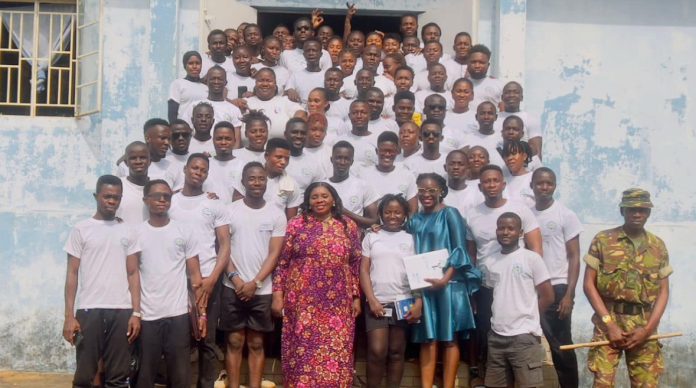AYV News, February 14, 2024
The Chairperson of the Human Rights Commission of Sierra Leone (HRCSL), Patricia Narsu Ndanema delivered an eye-catching public lecture on Fundamental Human Rights Issues to approximately 400 National Youth Service Corps at the Peace Mission Training Center, Hastings in Freetown.
The Chairperson’s lecture centered on the definitions of human rights, categories of rights, local regional and international human rights instruments, basic characteristics of human rights, human rights abuses and human rights violations and citizens responsibilities to promote human rights.
She informed students about the importance of knowing human rights laws/instruments, which are crucial for claiming rights within the confines of the law, adding that rights are enshrined in the law and protected by the state. She cited several examples on how people have claimed their rights within the confines of the law and strongly encouraged all of them to read and get themselves abreast with these laws.
She spoke briefly about the categories of human rights citing civil and political rights, and Economic, Social and Cultural Rights (ESCR) as examples of the categories of rights. She further highlighted the rights to life, freedom of assembly and association, freedom of movement and freedom of speech as examples of the first generation of rights (Civil and Political Rights). Rights to education, health, work, social security as examples of ESCR.
Mrs. Ndanema drew the attention of the female students to be aware of the laws put in place to protect women’s rights and make use of the effective provisions therein and noted that the state has its own human rights obligations which are to protect, respect and fulfil human rights.
The Chairperson dilated on the rights to freedom of speech, noting that it is one’s constitutional right guaranteed by law but that does not pave the path for right holders to make demeaning statements or defame people’s character or make false allegations with no proof or evidences of the issues raised against them.
She touched on some of the local, regional and international human rights instruments and encouraged students to familiarize themselves with especially local laws protecting their rights, citing the Persons with Disability Act and the Customary Marriage and Divorce Act.
She also informed students that even though they have rights, it cannot be fully enjoyed as there are circumstances where the enjoyment of some of these rights can be restricted or limited within the confines of the law, citing state of emergency as an example where citizens’ rights to freedom of movement can be limited, as well as the outbreak of contagious diseases.
“Making human rights real should be the collective responsibility of all of us. Human rights are indivisible and they cannot be shared,” she said and added that a good citizen must always abide by the laws of the country.
The topics discussed during the lecture generated a lot of discussions among the students, who were given the opportunity to ask thought-provoking questions and make salient contributions based on the knowledge acquired.
Human Rights Officer, Ms. Olive Sesay informed the students about the establishment of the Commission, its functions, and the various Directorates created to help the Commission achieve its mandate of protecting and promoting the rights of all in the country. She encouraged all to access the services of the Commission’s Directorate of Complaints, Investigations and Legal Services which receives complaints on human rights issues from the general public.
The Corps expressed appreciation to the Human Rights Commission of Sierra Leone and noted that the knowledge gained during the session will go a long way in helping them live a life worthy of a human rights based conduct.

